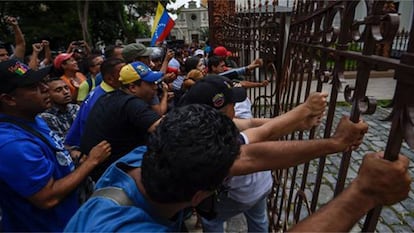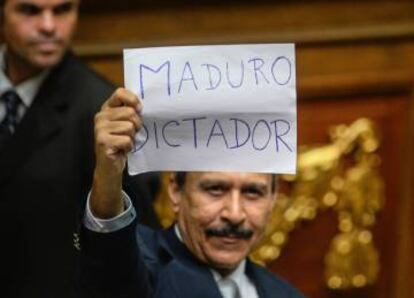Violent mob storms Venezuela’s National Assembly
Angry pro-government protesters disrupted special session on whether to try President Nicolás Maduro

Pro-government protesters stormed Venezuela’s National Assembly on Sunday during a special session to discuss the possibility of a political trial against President Nicolás Maduro, whom the opposition-controlled chamber accuses of driving the once-prosperous oil nation into political and economic ruin.
The session was being held in the wake of a decision by the National Electoral Council (CNE) to indefinitely suspend the recall referendum against Maduro that the opposition has been organizing.
Venezuela seems to be striding towards a definitive decision regarding its political conflict
The opposition on Sunday called this suspension “a coup d’état” and “a break with the constitutional order.” It said that the government has been placing constant hurdles in the path of a recall vote that is encoded as a right in the Venezuelan Constitution.
The serious incidents of Sunday reflect the escalating violence in a nation where the executive and the legislative are at war with each other. The opposition has already asked the international community for support.
Noise outside
The vice-president of the National Assembly, Enrique Márquez, was addressing the plenary meeting when loud voices were heard outside the chamber. El Capitolio TV, the online parliament channel, interrupted its coverage of the session to show footage of the gardens, where an angry crowd bearing imagery of chavismo ideology – the left-wing ideology based on the political thinking of late president Hugo Chávez who died in 2013 – and United Socialist Party flags was chanting slogans and destroying everything in its wake.

But the worst incidents took place inside the protocol room, where the former Senate used to be housed. Manuel Rojas Pérez, an opposition representative for the municipality of Chacao, told EL PAÍS that the crowd assaulted the people inside the room. Insults and blows were exchanged, and chairs pushed out of balconies.
“We were locked up for several minutes,” said Manuel Rojas.
The mayor of Libertador (center-west of Caracas), Jorge Rodríguez, then entered the legislative chamber to try to convince the crowd to pull back. More insults were hurled at the speaker of the house, and protesters promised that control over the National Assembly – in the hands of the opposition since elections in December – would be “returned to Chávez’s people.”
Members of the mob also committed theft and destroyed camera equipment to prevent live coverage by the media. CNN reporter Osmary Hernández said that a man tried to grab her cellphone and GoPro camera, and was stopped by two other men who came to her aid. Reporters for Globovisión had a camera smashed. Other individuals took three bullet-proof vests from TeleCaribe reporters at gunpoint.
A precedent
There is a much more violent precedent of an assault on Venezuela’s public powers, but it goes back to January 24, 1848, when Congress was stormed in a bid to try President José Tadeo Monagas for failing to respect the Constitution.
The vice-president of the National Assembly brought up this historical incident after the chavista mob vacated the premises, around one hour later.
Maduro on trial
Venezuela seems to be striding towards a definitive decision regarding its political conflict. Parliament on Sunday agreed to discuss “the constitutional situation of the presidency of the Republic” at its next regular session this Tuesday.
This expression is a euphemism for the possibility of Maduro, who is currently on a tour of the Middle East, abandoning office. The lower chamber also wants to discuss new names for the Electoral Power and for the Supreme Court of Justice, which holds the key to power in Venezuela.
English version by Susana Urra.
Tu suscripción se está usando en otro dispositivo
¿Quieres añadir otro usuario a tu suscripción?
Si continúas leyendo en este dispositivo, no se podrá leer en el otro.
FlechaTu suscripción se está usando en otro dispositivo y solo puedes acceder a EL PAÍS desde un dispositivo a la vez.
Si quieres compartir tu cuenta, cambia tu suscripción a la modalidad Premium, así podrás añadir otro usuario. Cada uno accederá con su propia cuenta de email, lo que os permitirá personalizar vuestra experiencia en EL PAÍS.
¿Tienes una suscripción de empresa? Accede aquí para contratar más cuentas.
En el caso de no saber quién está usando tu cuenta, te recomendamos cambiar tu contraseña aquí.
Si decides continuar compartiendo tu cuenta, este mensaje se mostrará en tu dispositivo y en el de la otra persona que está usando tu cuenta de forma indefinida, afectando a tu experiencia de lectura. Puedes consultar aquí los términos y condiciones de la suscripción digital.








































